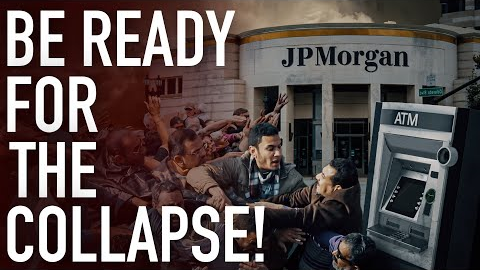Biggest Banks Leave Americans Without Money As Account Shutoffs Begin
47,133 View
Share this Video
- Publish Date:
- November 15, 2023
- Category:
- Where to Buy
- Video License
- Standard License
- Imported From:
- Youtube
Tags

Banks are closing down personal accounts without any notice, according to a new report released by the New York Times. That comes as the credit crisis continues to worsen and hurt Americans financially. Banks are now trying to reduce the risk of losses and failures, even if that means leaving people without access to their funds. Conditions continue to deteriorate in the financial sector, which is putting many institutions in a tough situation right now.
The Times reported that the number of clients getting dumped by their banks is rising dramatically. Experts estimate that thousands of people are losing access to their bank accounts and credit cards every month. Oftentimes, they are restricted from withdrawing their funds for weeks and months That is leaving many people scrambling to pay their bills and buy everyday essentials right now. Even though banks do not reveal precise data on how often they are doing this, analysts observed a 50% increase in the number of "suspicious activity reports" (SARs), which typically lead to them ghosting customers without warning.
Analysts tracked a series of real-life examples of customers getting abruptly dropped by their banks and exposed plenty of instances where the decision was not just sudden but completely unjustified. Delinquent customers face the highest risk of having their accounts shut down. Americans took on a massive amount of debt in recent years, and as interest rates went up and made loans more expensive, it’s getting more difficult to get out of debt.
At the same time, it’s also getting harder to have access to loans as banks continue to tighten their lending standards. This is cutting an important credit line for millions of struggling consumers at a time when pandemic aid has waned and inflation is making more people need an additional form of financial support.
Officials revealed that not only consumers but all major sectors of the economy are being impacted by the credit crisis. Banks reported tighter standards for all commercial real estate categories, residential real estate, credit card, auto, and other business loans in October. Their reasons to limit borrowing to businesses at this point in the game include “a less favorable and more uncertain economic outlook; a reduced tolerance for risk; a deterioration in the credit quality of loans.”
So far this year, banks experienced $620 billion in mark-to-market losses on their Treasury bond portfolio. The latest fall in Treasury bond prices will only add more pressure on them. Moreover, U.S. bank stocks have fallen to an all-time low in 2023 compared with the S&P 500 index. With all that said, you can understand why banks are panicking right now. Just a few days ago, another bank failure occurred. The latest bank failure has raised many questions about the Fed’s current mantra of high-interest rates for longer. It seems to be doing more harm than good to the economy. It’s hard to grasp why policymakers are still withdrawing $95 billion a month in market liquidity at a time when the Treasury is having trouble financing itself at reasonable interest rates.
If the Fed continues to inflict significant losses on banks' balance sheets through higher interest rates, the credit crisis might become the next financial crisis, and it will likely hit us before the middle of next year.
Did you miss our previous article...
https://trendinginrealestate.com/where-to-buy/how-to-find-the-right-realtor-for-you














